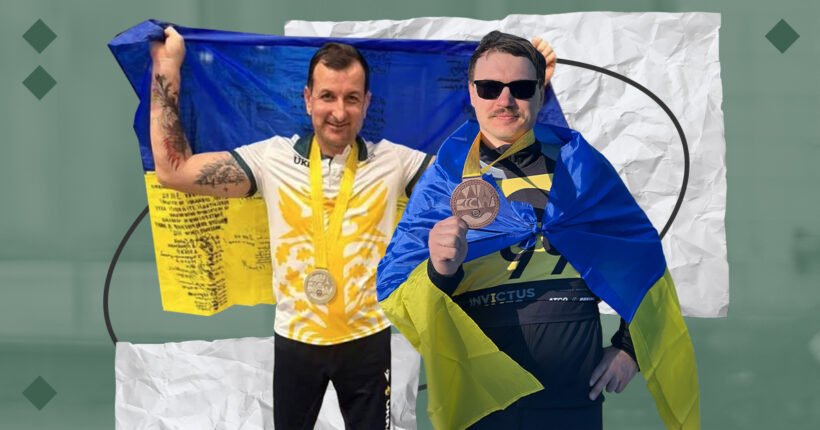
Artur Mylin and Valerii Odainyk were among the Ukrainian medalists at the Invictus Games 2025, where Ukraine ranked among the top three teams by total medals. Artur took home gold in swimming, bronze in biathlon, and bronze in wheelchair basketball. Valerii won silver in indoor rowing, bronze in Nordic cross-country standing skiing, and bronze in sitting volleyball as part of Team Ukraine.
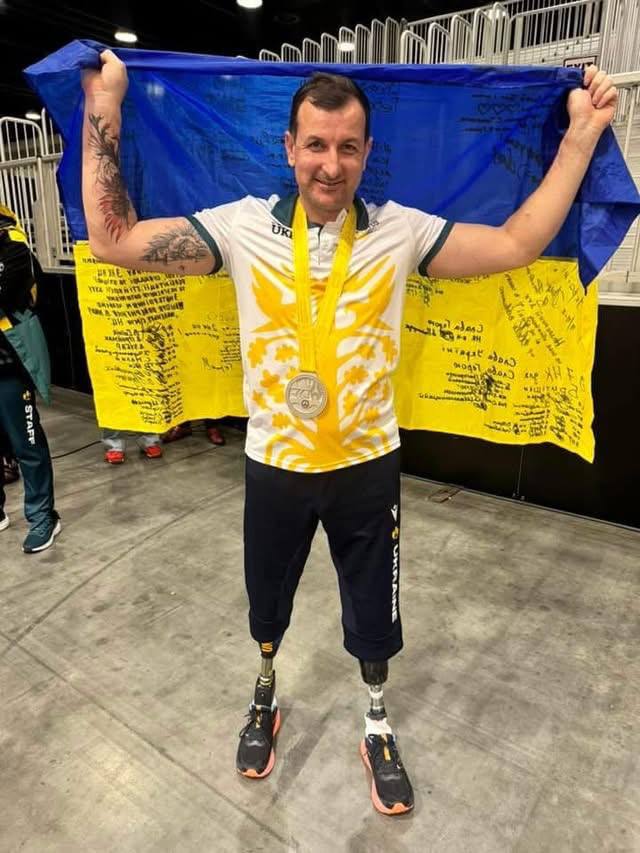
Valerii Odainyk poses with a Ukrainian flag after one of the award ceremonies. Photo courtesy of Valerii Odainyk
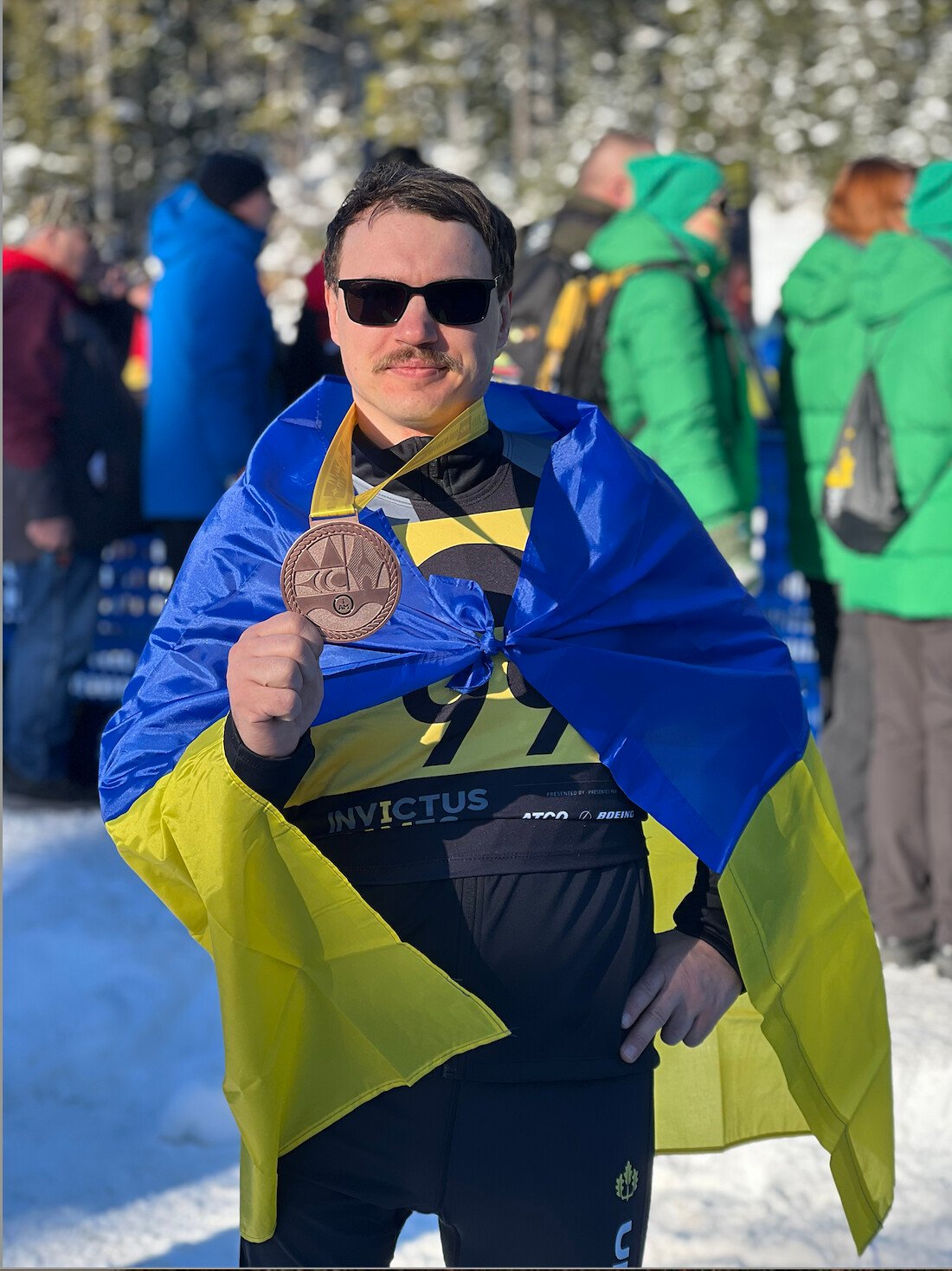
Artur Mylin is the bronze medalist in biathlon. Photo courtesy of Artur Mylin
Artur Mylin and Valerii Odainyk were among the Ukrainian medalists at the Invictus Games 2025, where Ukraine ranked among the top three teams by total medals. Artur took home gold in swimming, bronze in biathlon, and bronze in wheelchair basketball. Valerii won silver in indoor rowing, bronze in Nordic cross-country standing skiing, and bronze in sitting volleyball as part of Team Ukraine.
Both men sustained severe wounds while defending Ukraine from Russian forces in the Donetsk region. Both were clinically dead at one point, underwent multiple surgeries, and now live with amputations: Artur lost a leg, while Valerii lost a leg above the knee, the foot on his other leg, and a finger on his right hand.
We first spoke with Artur and Valerii in the fall of 2023, shortly after they received prosthetic limbs. Thanks to a joint program between the BGV Charity Fund and the Estonian government, they received state-of-the-art prosthetic limbs for free —part of an initiative to help Ukrainians who lost limbs due to the war.
Both Artur and Valerii were involved in sports long before the full-scale war. Artur has been passionate about powerlifting since his student days, while Valerii was a physical education teacher and basketball coach at the university in Kamianets-Podilskyi. They insist that you don't have to be a professional athlete to benefit from sports as a form of rehabilitation — it's for everyone.
The Invictus Games is an international event organized by the Invictus Games Foundation, founded by Prince Harry. Its mission is to aid the rehabilitation of wounded and injured service members and veterans through sports. The first games were held in 2014, and Ukraine has competed since 2016.
This year's Invictus Games — the seventh overall and the fifth for Ukraine — were held from February 8 to 16, 2025, in Vancouver and Whistler, Canada. Team Ukraine, consisting of 35 men and women, won 32 medals, finishing behind the United States and Australia in the medal count.
"The Invictus Games aren't about medals — they're about recovery"
"The most important thing about this event is that it's not a competition. It's not about sports — it's about recovery and rehabilitation," says Artur Mylin, a gold and bronze medalist at the Invictus Games 2025. Artur is not just an athlete — he's also a researcher at the Institute for Sorption and Problems of Endoecology at Ukraine's National Academy of Sciences, a PhD in Chemistry, and a veteran of the 131st Battalion of the 112th Territorial Defense Brigade, who was seriously injured in Terny, Donetsk region.
According to Artur, this is what makes the Invictus Games special: it doesn't matter how successful you are or which sport you compete in. If you're physically active and see sports as a way to heal, these Games are for you.
"My motto for these games was to have fun," says Artur. He also acknowledges that sports aren't easy — they require constant effort and perseverance. Every round of applause and cheers from the stadium, he says, are well-earned by all veterans and wounded service members competing.
Artur Mylin and Illia Pylypenko were the first to bring home medals for Ukraine at the Invictus Games 2025.
"My first event was wheelchair basketball. But I wasn't playing for Team Ukraine — I played for Unconquered, a mixed team of athletes from different countries," Artur explains.
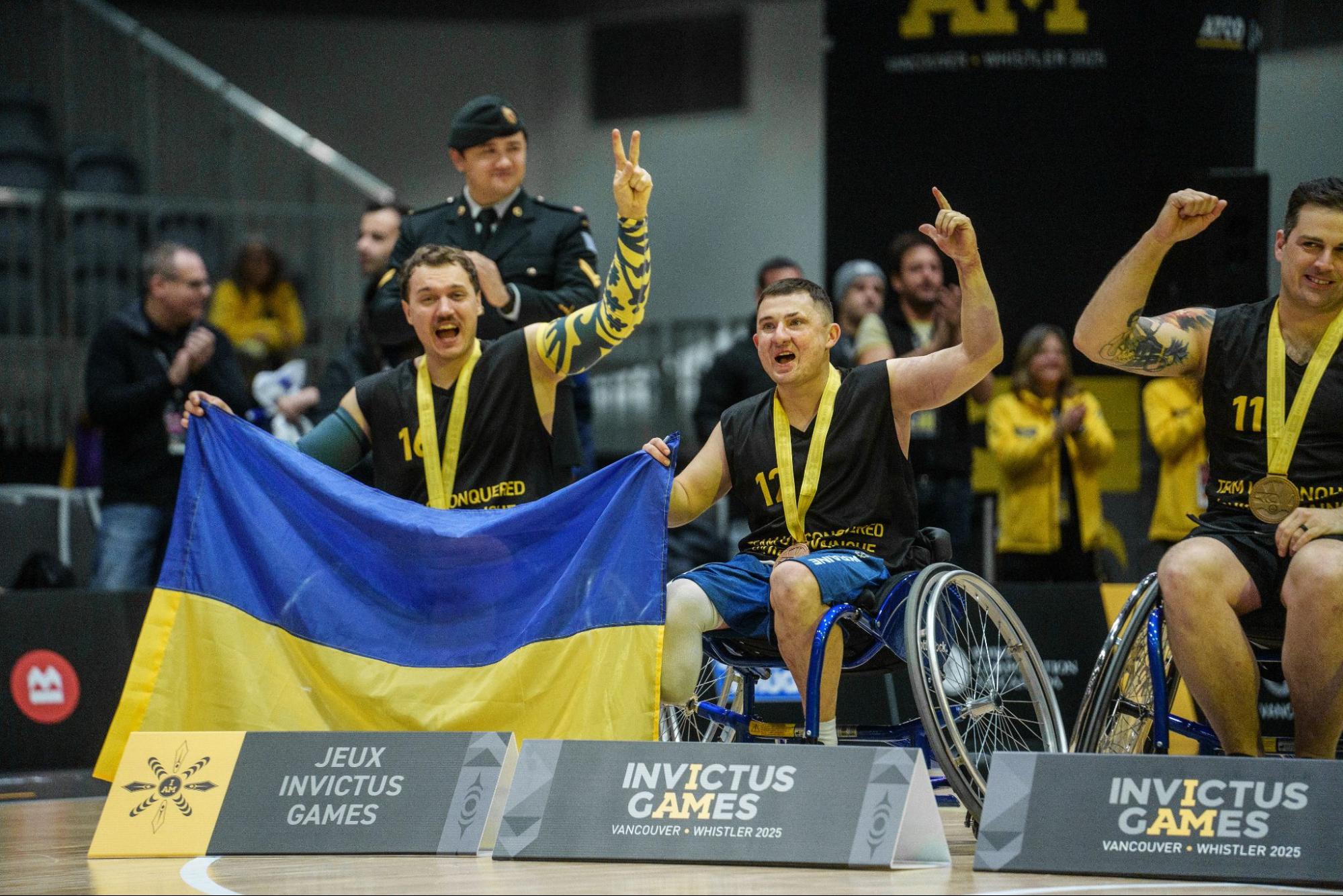
Artur Mylin (first left) celebrates a wheelchair basketball victory
"It was absolutely incredible. My teammates were Illia Pylypenko and a group of Americans. We met for the first time at around 7:00 a.m., and our match was at 8:00 a.m. The Americans had only just found out they'd be playing for Unconquered that morning. So we agreed: 'Let's just have fun. No pressure, no coaching, no stress.' We rolled onto the court to enjoy the game, knowing we had almost no chance of winning," Artur recalls.
Yet, in a historic first for the Invictus Games, Team Unconquered won a bronze medal — the first-ever medal for a mixed international team. That meant each player brought home a medal for their national team on the very first day of competition.
"The support from the stadium was insane! I mean, how cool it is to cheer for a team of total strangers from different countries who have never played together but still deliver results. Illia and I were over the moon. Honestly, it was one of the best days of my life. We came together in the morning with no expectations and finished the day on the podium," says Artur.
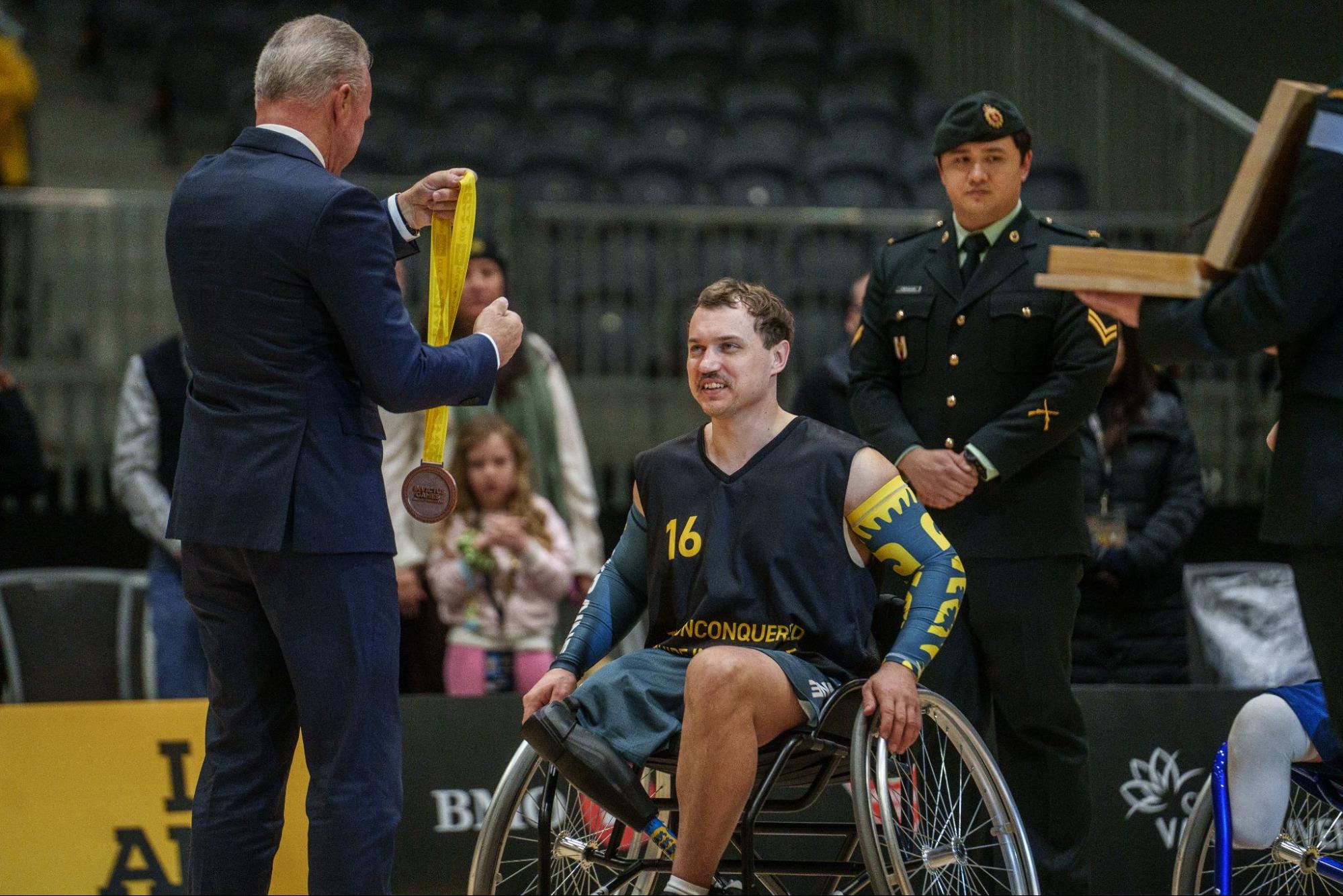
Artur Mylin receives the first medal at the Invictus Games 2025
Artur jokingly calls himself "an ambassador of Ukraine" in team sports because, throughout the Games, he played on four different Unconquered teams.
In individual events, he won bronze in biathlon and gold in the 50m breaststroke swimming event.
What it means to be "lucky"
"I call it luck. But when people say, 'Come on, how is that luck?' I start explaining. I was lucky to find the right coach and meet people who genuinely wanted to help and guide me. Lucky to have a family that encouraged every training session. Lucky to be surrounded by friends and a community that supported me. That kind of luck made it possible for me to reach such a high level," says Artur Mylin.
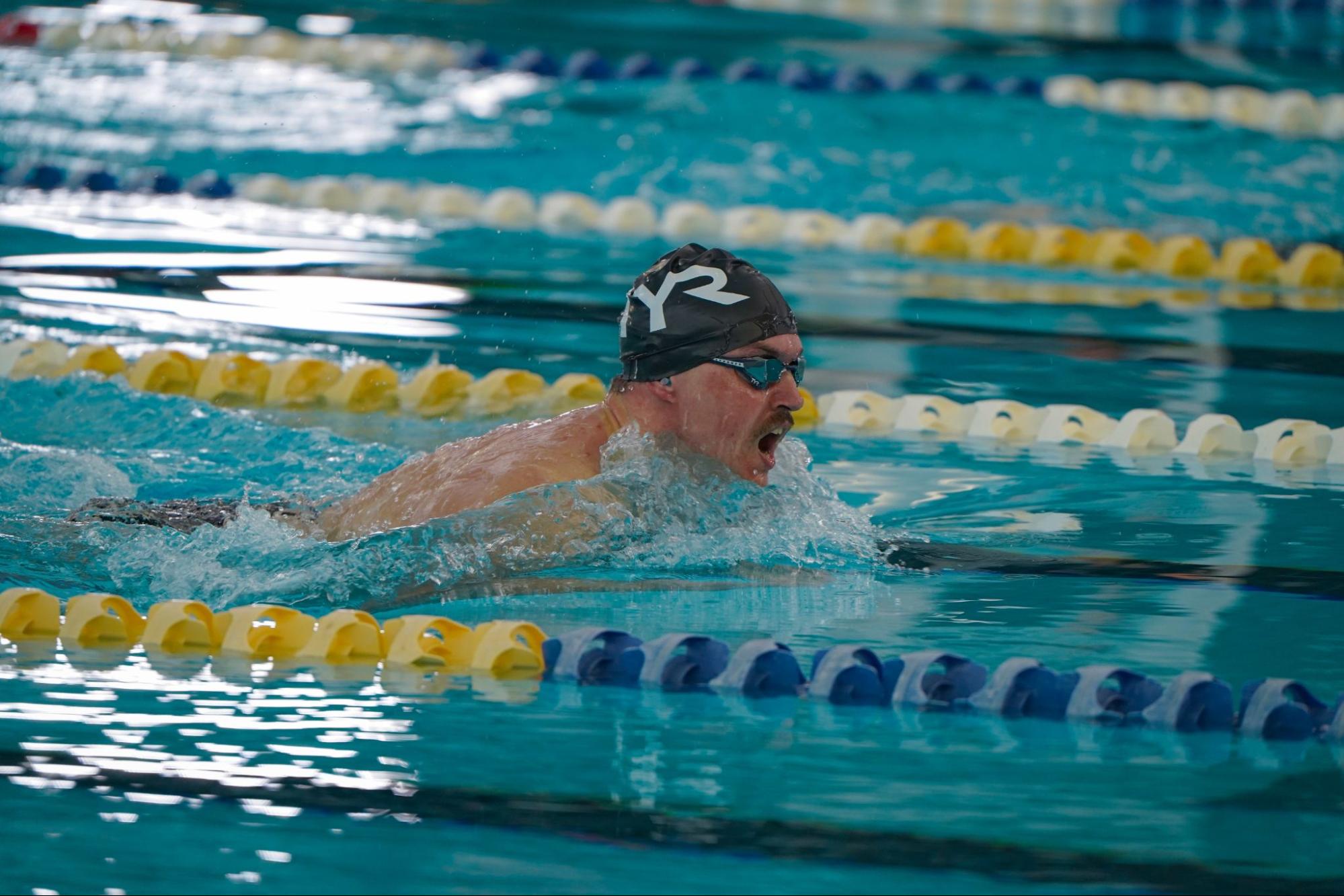
Artur Mylin during a swimming competition. Photo courtesy of Artur Mylin
Pride in showing the world Ukraine's resilience
Valerii Odainyk, a serviceman and captain at the 143rd Podillia Training Center, remembers the overwhelming emotions at the start of the competition in Canada.
"I felt an immense sense of pride — pride in representing my country and showing the world the unbreakable spirit of our nation. In proving that we are fighting a ruthless enemy with everything we have to protect our land and our loved ones from the disaster they've brought upon us."
Valerii admits he felt the heavy responsibility of carrying Ukraine's name throughout the competition.
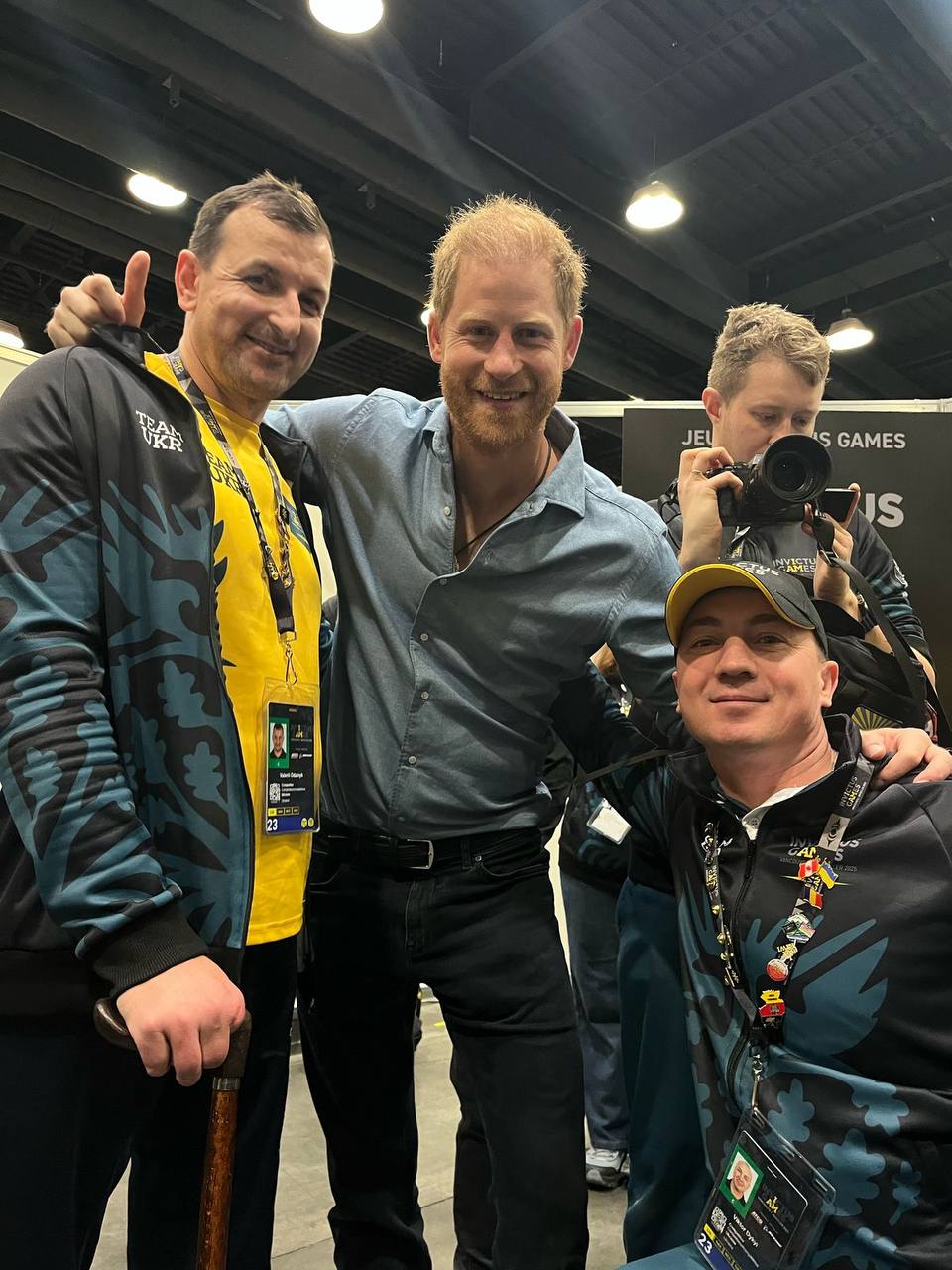
Valerii Odainyk (far left) with the founder of the Invincible Games, Prince Harry
"And it was a personal challenge — to prove to myself what I was capable of. To see that I had crossed a threshold, that I was no longer where I had been right after my injury but at a new stage of recovery," the veteran says.
For Valerii, participating in the Games was first and foremost about proving to himself that when you lose something, you gain something else. It's a battle with yourself, he says.
"We spent a year preparing for these Games, and in between training camps, I had surgeries. During one camp, I broke my ribs in training. That was another fight with myself — to recover and come to the competition in my best possible shape. After every surgery, I had to go from prosthetics back to a wheelchair. Just two or three weeks before leaving for Canada, I stood up on my prosthetics again and had to learn to walk all over," Valerii recalls.
A message to fellow soldiers: Everything is possible!
For both men, an important motivation for competing in the Invictus Games was to set an example for other wounded soldiers in Ukraine.
"To show my brothers-in-arms who are where I once was that I made it through, and they can too. That everything is possible," says Valerii.
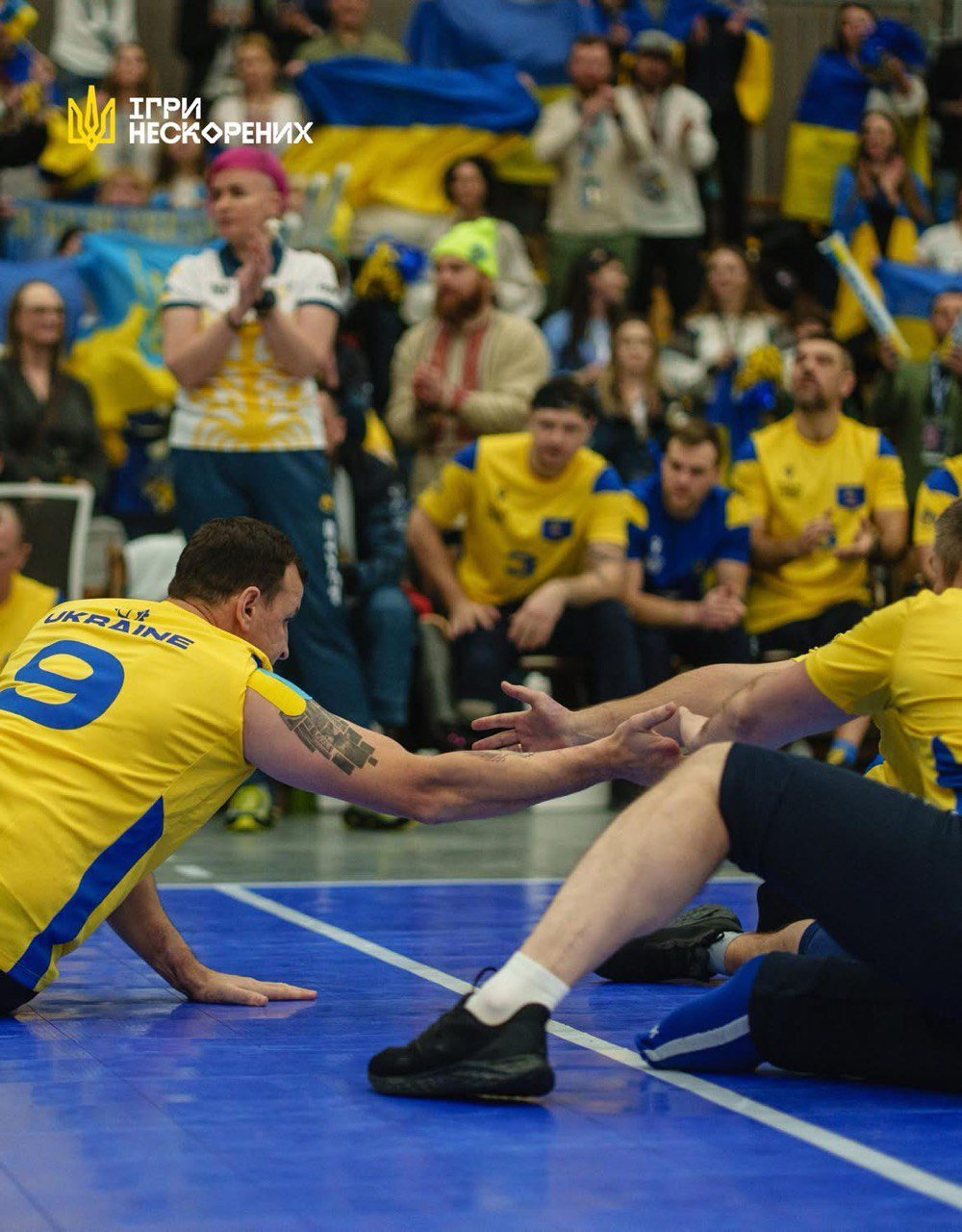
Valerii Odainyk during the team competition. Photo courtesy of Valerii Odainyk
Artur Mylin shares the same belief. He remembers how, before the Games, the Ukrainian diaspora in Canada organized a charity auction and asked the team members to donate personal items. Artur contributed a sweatshirt he wore in his first training sessions and during part of his rehabilitation. A Ukrainian artist from Kyiv helped illustrate his journey to the Invictus Games and create a print for the sweatshirt. From August 2023 to May 2024, when Artur officially qualified for the national team, he competed in nearly 20 sporting events.
"There was swimming, volleyball, weightlifting, kettlebell lifting, target shooting — so many different sports, different places, different days. The Invictus Games are incredible, no doubt, but Ukraine also has so many organizations developing adaptive sports. They allow people to compete, feel those same emotions, and gain new experiences. And it's all free — organizers cover transport, accommodation, even meals," Artur explains.
He insists that inclusive sports in Ukraine are open to everyone — both beginners and those with experience. Through the state-run Invasport system, athletes with disabilities can even earn official sports rankings. Artur urges all wounded soldiers not to overlook these opportunities.
The most valuable gold
For Artur Mylin, the most precious gold medal won by the Ukrainian team at the Invictus Games 2025 belongs to Serhii Hordiievych. Serhii suffered a severe spinal injury and lost control of his legs. During a training camp in Bukovel, he tried skiing for the first time.
"For two days, he kept trying but thought it wasn't working. He was ready to give up. But the coaches wouldn't let him. They kept pushing him to try again. And in the end, he went to the competition in Canada — and won gold," says Artur. "To me, that's the most valuable medal our team has. Seeing his daughter's joy, witnessing his emotions, and hearing him say he could finally relive the skiing experience as he did before his injury — that, to me, is what matters most."
Why sports matter in rehabilitation
Valerii Odainyk, who taught physical education and coached a university basketball team before joining the Ukrainian Armed Forces, believes that sports provide a unique and varied experience.
For many wounded soldiers, rehab means repeating the same exercises in a controlled environment designed for people with disabilities. "But sports push us to develop through discomfort. It's a barrier — both mental and emotional — that we have to overcome. But once we adapt and learn to navigate those challenges, we become more prepared for the difficulties of everyday life. And that helps tremendously," says Valerii.
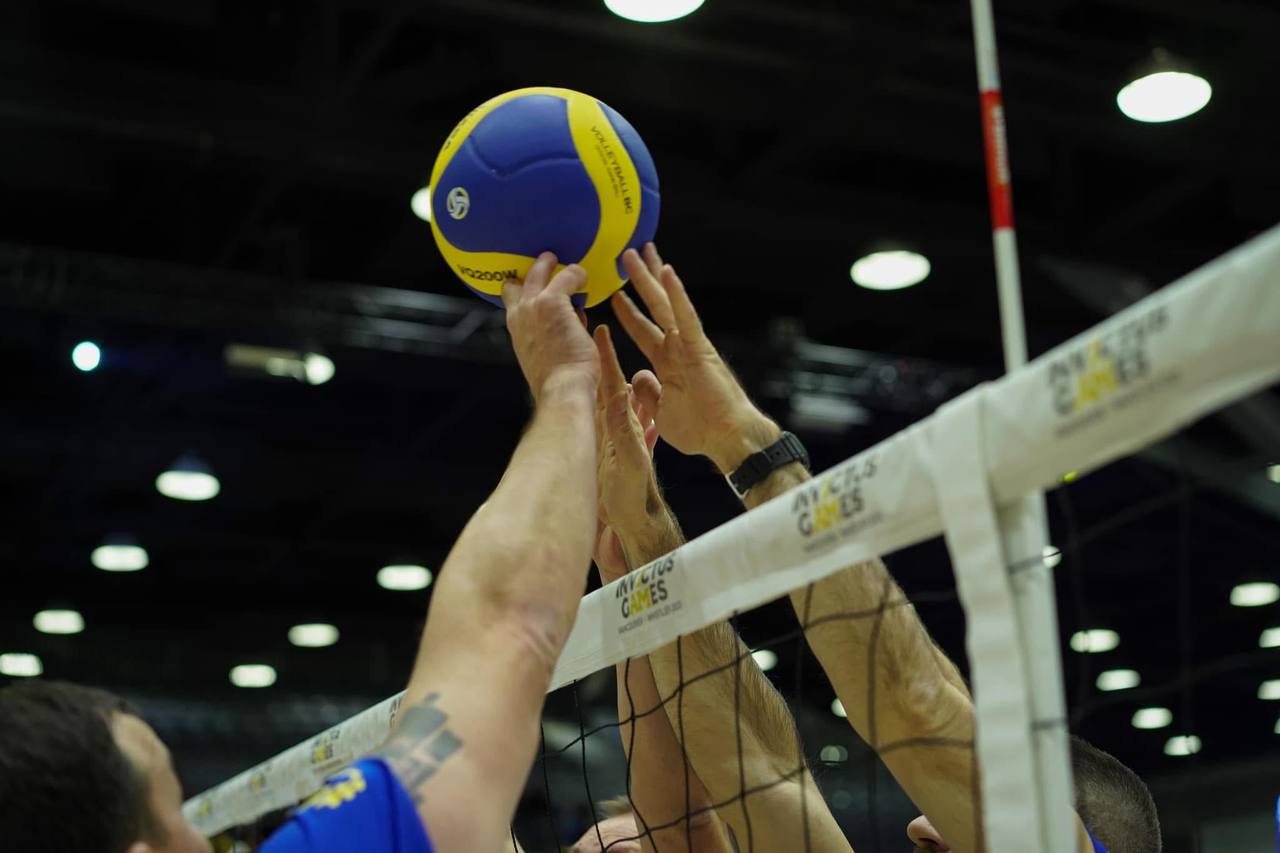
A game moment during a sitting volleyball competition. Valerii Odainyk holds the ball. Photo courtesy of Valerii Odainyk
Artur Mylin says the Invictus Games help families heal, too. A close relative joined him at training sessions, encouraging him to keep going. Then Artur inspired the friend to sign up as well.
"Non-disabled people can play sitting volleyball alongside us. They just sit down, toss the ball around, and before they know it, they're competing in full-fledged teams," he says.
Artur adds, "And the rush of emotion? It's just like standing volleyball. You need quick reflexes, a strong serve, and a strategy to outsmart your opponent. It's exciting and intense. And when you're fully into the game, you forget whether you're on your feet or not — it doesn't matter anymore."
Beyond the competition, sports play a crucial role in social reintegration. Artur remembers an early visit to his prosthetist during his rehabilitation. The doctor asked how many hours a day he used his prosthetic leg. "Two," the soldier admitted. He still relied on crutches at home.
"But now I'm on my prosthetic six to eight hours a day, almost nonstop," Artur says.
The veteran credits the Invictus Games for that change. When Artur first lost his leg, he thought he'd never take a train again. Then, he had to travel to a training camp in Sambir.
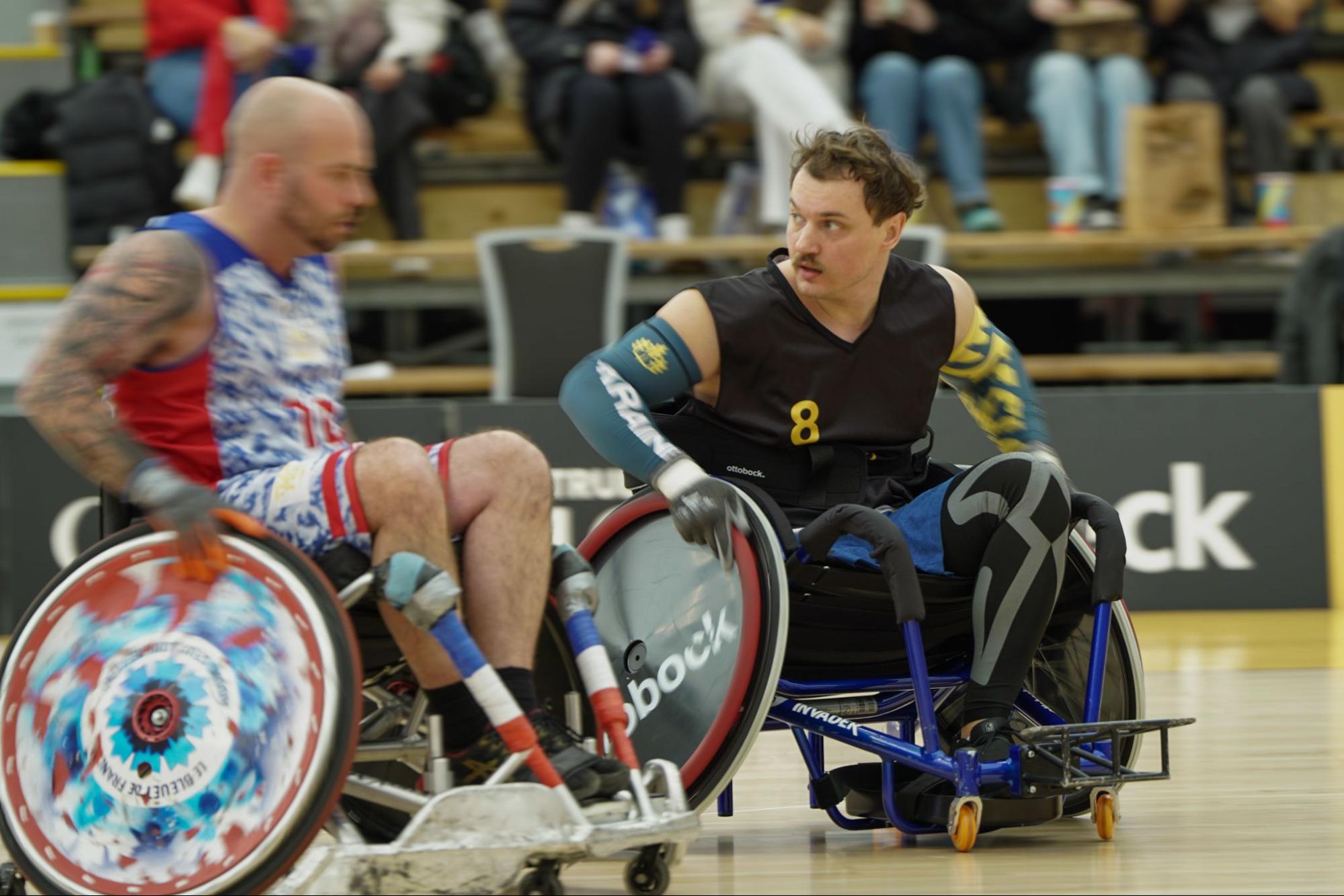
Artur Mylin competes as part of the Unconquered team. Photo courtesy of Artur Mylin
"Want it or not, but you just do it and get on that train, have a seat, and get yourself used to the old situations as the new you. Then you realize you can do it — adapting isn't as hard as it seems. That experience changed everything for me," the veteran shares.
Now, Artur can't imagine spending two weeks stuck at home or moving around on crutches.
"My life has become so active that I don't even have the option to sit around for five days doing nothing. And I wish that for everyone. Because I know guys who are afraid to go outside in winter. I was the same way. But that's why we have veterans who've gone through injuries before us — we need to learn from their experience," he says.
Boosting adaptive sports in Ukraine
This year's Invictus Games were hybrid and included winter and summer sports for the first time. Artur believes this decision gave adaptive athletics in Ukraine a huge push forward.
The Ukrainian team started training in the summer: cross-country skiers practiced on roller skis in Bukovel, and snowboarders trained on balance boards in Kyiv. Coaches in Canada took notes from the athletes of the Unconquered team to refine programs in Ukraine.
Artur Mylin believes that the Invictus Games drive adaptive sports in Ukraine, and veterans can keep that momentum going.
"Sometimes, you don't need big budgets, fancy equipment, or a cool gym to start. Take sitting volleyball. You only need a net, a ball, and a regular school gym. That's it," says Artur.
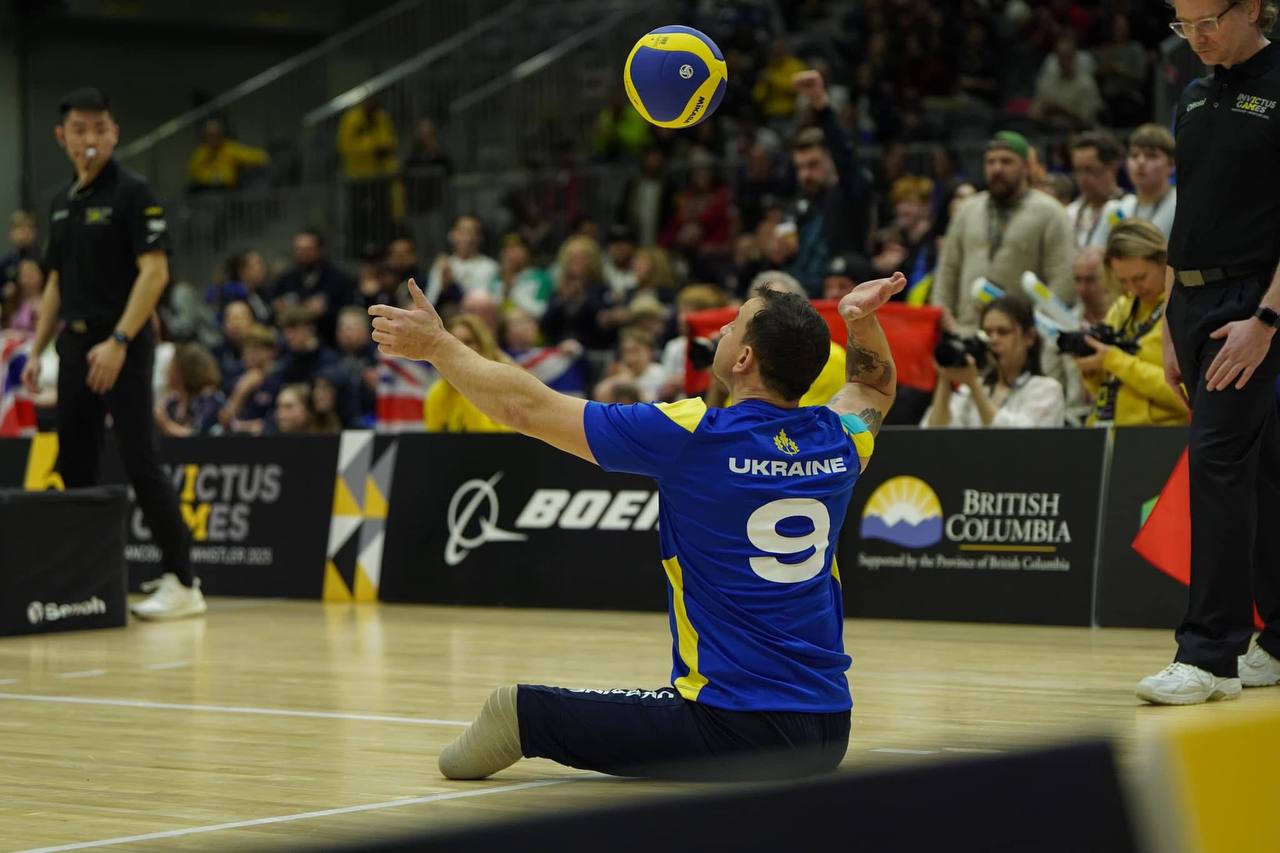
Valerii Odainyk (far left) during a team game. Photo courtesy of Valerii Odainyk
Valerii Odainyk plans to stay in sports and encourage as many wounded soldiers as possible to join. He also stresses that Ukraine must include veterans and disabled service members in accessibility initiatives.
At a meeting with local officials in Khmelnytskyi, where the Ukrainian team was honored for its victories, Valerii made this point clear: accessibility must be more than just ideas on paper. Projects need to become a reality, especially in small towns and villages.
In Canada, Ukraine's Invictus athletes felt overwhelming support from the Ukrainian diaspora and Canadians.
"They told us, 'We understand that you're defending yourself. We support you.' That meant everything to me," Artur says. "To know you're not alone and the choice you made to defend your country was the right one. Yes, I lost a part of myself. But it was worth it."







